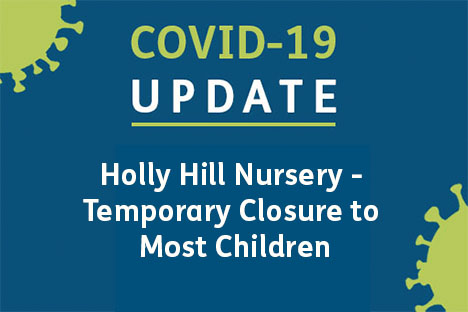There has been updated guidance provided to us from the Government to close the nursery for many of our children until further notice.
As advised by the Government, the nursery will remain open to the children of key workers, a list of key workers provided by the Government is included at the bottom of this page. If you are unsure if you fit into one of these categories please contact the nursery on 0191 295003 or info@hollyhillnursery.co.uk for further guidance.
All other children will need to stay at home, so we ask that you do not bring them into nursery. We apologise for the inconvenience caused at this unprecedented time and thank you for your understanding. This is part of a national closure to all schools and nurseries and we will reopen the nursery to all children as soon as it is safe to do so.
We have vacancies in each of our rooms at Holly Hill Nursery and are currently admitting children of key workers. Please contact us on 0191 295003 or info@hollyhillnursery.co.uk with any enquiries and we can arrange a visit to nursery.
Please feel free to contact us on 0191 295003 or info@hollyhillnursery.co.uk with any concerns that you may have.
For further information please visit this gov.uk school closure information for parents and carers webpage. If your child is feeling unwell please use the NHS website for advice.
Key Workers
Parents whose work is critical to the COVID-19 response include those who work in health and social care and in other key sectors outlined below.
If your work is critical to the COVID-19 response, or you work in one of the critical sectors listed below, and you cannot keep your child safe at home then your children will be prioritised for education provision:
Health and social care
This includes but is not limited to doctors, nurses, midwives, paramedics, social workers, care workers, and other frontline health and social care staff including volunteers; the support and specialist staff required to maintain the UK’s health and social care sector; those working as part of the health and social care supply chain, including producers and distributers of medicines and medical and personal protective equipment.
Education and childcare
This includes nursery and teaching staff, social workers and those specialist education professionals who must remain active during the COVID-19 response to deliver this approach.
Key public services
This includes those essential to the running of the justice system, religious staff, charities and workers delivering key frontline services, those responsible for the management of the deceased, and journalists and broadcasters who are providing public service broadcasting.
Local and national government
This only includes those administrative occupations essential to the effective delivery of the COVID-19 response or delivering essential public services such as the payment of benefits, including in government agencies and arms length bodies.
Food and other necessary goods
This includes those involved in food production, processing, distribution, sale and delivery as well as those essential to the provision of other key goods (for example hygienic and veterinary medicines).
Public safety and national security
This includes police and support staff, Ministry of Defence civilians, contractor and armed forces personnel (those critical to the delivery of key defence and national security outputs and essential to the response to the COVID-19 pandemic), fire and rescue service employees (including support staff), National Crime Agency staff, those maintaining border security, prison and probation staff and other national security roles, including those overseas.
Transport
This includes those who will keep the air, water, road and rail passenger and freight transport modes operating during the COVID-19 response, including those working on transport systems through which supply chains pass.
Utilities, communication and financial services
This includes staff needed for essential financial services provision (including but not limited to workers in banks, building societies and financial market infrastructure), the oil, gas, electricity and water sectors (including sewerage), information technology and data infrastructure sector and primary industry supplies to continue during the COVID-19 response, as well as key staff working in the civil nuclear, chemicals, telecommunications (including but not limited to network operations, field engineering, call centre staff, IT and data infrastructure, 999 and 111 critical services), postal services and delivery, payments providers and waste disposal sectors.
If workers think they fall within the critical categories above they should confirm with their employer that, based on their business continuity arrangements, their specific role is necessary for the continuation of this essential public service.







